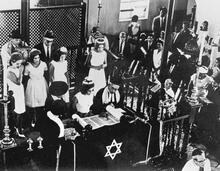Libbie Suchoff Berkson
Libbie Suchoff Berkson was beloved by generations of campers as Aunt Libbie, director of Camp Modin for girls. Berkson taught public school and earned her Master’s degree in 1915 before becoming director of the League of Jewish Youth, an informal education program for teenage girls. In 1922, she returned to teaching but also began creating a Jewish summer camp in Maine with her husband and two other couples. By 1942, the Berksons were the sole owners of Camp Modin, which had daily Conservative services and a kosher kitchen. Berkson worked as director until her retirement in 1958. For several years, the Berksons lived in Jerusalem, where Berkson helped create an experimental kindergarten and established a teahouse but returned to camp each summer.
“Hoy, hoy, Yefefia, bat harim Modinia.” “Aunt Libbie” Berkson, a pioneer of Jewish education, led this song every summer at the start of Friday night zemirot singing at Camp Modin for girls. Generations of campers who attended Camp Modin were influenced by her spirit and leadership.
Early Life and Family
Libbie Suchoff Berkson was born on November 17, 1891, the fourth of six children, in Luptsch, a town near Minsk. Her father, Benjamin Suchovitsky, was a medical worker. He died when Libbie was nine years old. With her mother, Dina (Cahan), and her one sister and four brothers, she immigrated to the United States in 1903. The family settled on the Lower East Side of New York City. There, Libbie learned English so that she spoke it with no European accent. She attended New York public schools, received her B.A. degree from Hunter College in 1911, became a teacher in the New York public schools, and received her M.A. from Teachers College, Columbia University in 1915.
While still in college, Berkson became involved in youth work. She was the first director of the Anti-Mission League, an organization that provided educational activities for Jewish children. This was the beginning of her lifelong career of leadership in that field. As one of the original members of Samson Benderly’s program of Jewish education, she was director of the League of Jewish Youth, which was created to provide informal Jewish education to adolescent girls. While with the Benderly group, she met Isaac B. Berkson, the educational philosopher, administrator, and professor. They were married on November 27, 1919, and subsequently had three children, Dina (b. 1922), Carmel (b. 1924), and Gershon (b. 1931). From 1922 to 1927, Libbie Berkson also worked as a teacher and then became director of a Hebrew high school in Philadelphia.
Camp Modin
In June 1922, with Alexander and Julia Dushkin and Albert and Bertha Schoolman, Libbie and I. B. Berkson conceived the original idea of a summer “camp with the Jewish ideal.”
The camp was located in Canaan, Maine. When the Berksons became its sole owners in 1942, Libbie assumed the main responsibility. The camp retained its strong Jewish spirit, daily religious services in the Conservative tradition, and a strictly Term used for ritually untainted food according to the laws of Kashrut (Jewish dietary laws).kosher
kitchen—a major accomplishment for a camp in Maine in those days. She continued to direct Camp Modin until her retirement in 1958.
When I. B. Berkson became a member of the executive committee of the Jewish Agency in Palestine under the Mandate for Palestine given to Great Britain by the League of Nations in April 1920 to administer Palestine and establish a national home for the Jewish people. It was terminated with the establishment of the State of Israel on May 14, 1948.British Mandate from 1928 to 1933, the family lived in Talpioth, Jerusalem, where Libbie Berkson became involved in the organization of the first experimental Hebrew kindergarten. She also was a member of the Palestine Council of Hadassah, and later established a teahouse in Jerusalem (the Al Cos Te, now the popular Atara in Jerusalem). During these years, despite her strong affection for Palestine, she also traveled repeatedly to the United States to continue running Camp Modin, and ultimately the family returned to the United States permanently in 1935.
After her retirement from Camp Modin, she remained active with “her projects,” now completely focused on Israel. She helped with Mi Yeled l’Yeled, a project in which American children provided funds to buy books for children in Israel. She also worked with Nogah Hareuveni during the initial stages of establishment of Neot Kedumim, now one of Israel’s leading educational centers.
“Aunt Libbie” died on August 3, 1970, after a long illness and a final trip to Israel.
Dushkin, Alexander M. Living Bridges: Memoirs of an Educator (1975).
Skirball, Henry Franc. “Isaac Baer Berkson and Jewish Education.” Ed.D. diss., Columbia University Teachers College, NYC (1977).
Winter, Nathan H. Jewish Education in a Pluralist Society: Samson Benderly and Jewish Education in the United States (1966) WWIAJ (1938).




